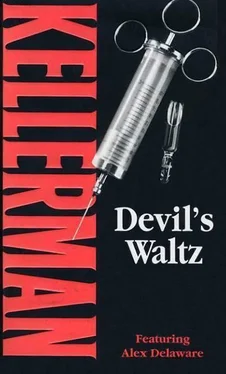Jonathan Kellerman - Devil's Waltz
Здесь есть возможность читать онлайн «Jonathan Kellerman - Devil's Waltz» весь текст электронной книги совершенно бесплатно (целиком полную версию без сокращений). В некоторых случаях можно слушать аудио, скачать через торрент в формате fb2 и присутствует краткое содержание. Город: London, Год выпуска: 1992, ISBN: 1992, Издательство: Little Brown, Жанр: Триллер, на английском языке. Описание произведения, (предисловие) а так же отзывы посетителей доступны на портале библиотеки ЛибКат.
- Название:Devil's Waltz
- Автор:
- Издательство:Little Brown
- Жанр:
- Год:1992
- Город:London
- ISBN:978-0-316-90289-2
- Рейтинг книги:5 / 5. Голосов: 1
-
Избранное:Добавить в избранное
- Отзывы:
-
Ваша оценка:
- 100
- 1
- 2
- 3
- 4
- 5
Devil's Waltz: краткое содержание, описание и аннотация
Предлагаем к чтению аннотацию, описание, краткое содержание или предисловие (зависит от того, что написал сам автор книги «Devil's Waltz»). Если вы не нашли необходимую информацию о книге — напишите в комментариях, мы постараемся отыскать её.
Devil's Waltz — читать онлайн бесплатно полную книгу (весь текст) целиком
Ниже представлен текст книги, разбитый по страницам. Система сохранения места последней прочитанной страницы, позволяет с удобством читать онлайн бесплатно книгу «Devil's Waltz», без необходимости каждый раз заново искать на чём Вы остановились. Поставьте закладку, и сможете в любой момент перейти на страницу, на которой закончили чтение.
Интервал:
Закладка:
“One hell of a family embarrassment, too, if it blows wide open and there’s a nasty divorce. Maybe that’s what Chuck’s trying to keep me away from. He talked about Chip and Cindy creating something solid — called Cindy a lovely girl. Even though she doesn’t seem like the girl a guy in his position would have wanted for his only daughter-in-law. On the other hand, from the look of his teeth, he came up the hard way himself. So maybe he’s not a snob.”
“His teeth?”
“They’re crooked and discolored. No one ever shelled out on orthodontia on his account. Fact is, his entire manner’s pretty rough.”
“Self-made man,” he said. “Maybe he respects Cindy for doing the same thing.”
“Who knows? Anything on why she left the army?”
“Not yet. Gotta press Charlie on that... Okay, I’ll check with you tomorrow.”
“If you find out anything from the bartender, call me first thing.”
There was a strain in my voice. My shoulders had bunched again.
Robin touched them and said, “What is it?”
I covered the phone and turned to her. “He’s found a lead to something that may or may not be related to the case.”
“And he called to invite you along.”
“Yes, but—”
“And you want to go.”
“No, I—”
“Is it anything dangerous?”
“No, just interviewing a witness.”
She gave me a gentle shove. “Go.”
“It’s not necessary, Robin.”
She laughed. “Go anyway.”
“I don’t need to. This is nice.”
“Domestic bliss?”
“Mega-bliss.” I put my arm around her.
She kissed it, then removed it.
“Go, Alex. I don’t want to lie here listening to you toss.”
“I won’t.”
“You know you will.”
“Being alone is preferable?”
“I won’t be. Not in my head. Not with what we’ve got going for us now.”
23
I tucked her in bed and went out to the living room to wait. Milo knocked softly just before midnight. He was carrying a hard-shell case the size of an attaché and had on a polo shirt, twill pants, and windbreaker. All in black. Regular-guy parody of the L.A. hipster ensemble.
I said, “Trying to fade into the night, Zorro?”
“We’re taking your car. I’m not bringing the Porsche down there.”
I pulled out the Seville; he put the case in the trunk, got in the passenger seat. “Let’s roll.”
I followed his directions, taking Sunset west to the 405 south, merging with hurtling trucks and the red-eye crowd heading out to the airport. At the junction with the Santa Monica Freeway, I hooked over toward L.A. and traveled east in the fast lane. The highway was emptier than I’d ever seen it, softened to something impressionistic by a warm, moist haze.
Milo lowered the window, lit up a panatela, and blew smoke out at the city. He seemed tired, as if he’d talked himself out over the phone. I felt weary, too, and neither of us said a word. Near La Brea a loud, low sports car rode our tail, belched and flashed its brights before passing us at close to a hundred. Milo sat up suddenly — cop’s reflex — and watched it disappear before settling back down and staring out the windshield.
I followed his gaze upward to an ivory moon, cloud-streaked and fat, though not quite full. It dangled before us like a giant yo-yo, ivory mottled with green-cheese verdigris.
“Three-quarter moon,” I said.
“More like seven-eighths. That means almost all the nuts’re out. Stay on the Ten past the interchange and get off at Santa Fe.”
He kept grumbling directions in a low voice, taking us into a broad, silent district of storehouses, foundries, and wholesale jobbers. No streetlights, no movement; the only vehicles I spotted were penned behind prison-grade security fences. As we’d traveled away from the ocean, the haze had lifted and the downtown skyline had turned chiseled and crisp. But here I could barely make out the shapes, miragelike against the matte-black stasis of the city’s outer limits. The silence seemed glum — a failure of spirit. As if L.A.’s geographical boundaries had exceeded its energy.
He directed me through a series of quick, sharp turns down asphalt strips that could have been streets or alleys — a maze that I’d never be able to reverse from memory. He’d allowed his cigar to go cold but the smell of tobacco stuck to the car. Though the breeze streaming in was warm and pleasant, he began raising the window. I realized why before he finished: A new smell overpowered the burnt-cloth stink of cheap leaf. Sweet and bitter at the same time, metallic, yet rotten. It leaked through the glass. So did noise — cold and resonant, like giant steel hands clapping — scraping the night-lull from somewhere far away.
“Packing houses,” he said. “East L.A. all the way down to Vernon, but the sound carries. When I first came on the force I drove a cruiser down here, on the night watch. Sometimes they slaughtered the hogs at night. You could hear them howling, smashing into things, and rattling their chains. Nowadays I think they tranquilize them — Here, turn right, then immediately left. Go a block and park anywhere you can.”
The maze ended on a skinny block-long straightaway bounded on both sides by cyclone fencing. No sidewalks. Weeds erupted through the tar like hairs on a wen. Cars lined both sides of the street, pushed up close to the fence.
I pulled into the first space I saw, behind an old BMW with a K-ROQ window sticker and a rear deck piled high with trash. We got out of the Seville. The air had cooled but the slaughterhouse smell remained — dribs and drabs of stench, rather than a constant assault. Changing wind, probably, though I couldn’t sense it. The machine scrape was gone, replaced by music — electric organ elf-squeaks and a murky bass, middle-range tones that might have come from guitars. If there was a beat, I couldn’t sense that either.
“Party time,” I said. “What’s the dance of the week?”
“Felony lambada,” said Milo. “Sidle up against your partner and rifle through his/her pockets.” He shoved his hands in his pockets and slouched forward.
We began walking up the street. It dead-ended at a tall, windowless building. Pale-painted brick walls that a couple of red lights turned pink. Three stories — a trio of successively smaller cubes stacked atop one another. Flat roof, steel doors asymmetrically placed under a random assortment of shuttered windows. A tangle of fire-escape ladders hugged the facade like cast-iron ivy. As we got closer I saw huge, faded letters painted above the dock: BAKER FERTILIZER AND POTASH CO.
The music got louder. Heavy, slow, keyboard solo. Voices became audible in between notes. As we got closer, I saw a line of people S-curved in front of one of the doors — a fifty-foot ant-trail that dipped into the street and clogged it.
We began passing the line. Faces turned toward us sequentially, like animated dominoes. Black duds were the uniform, sullen pouts the mask. Boot chains, cigarettes — legal and otherwise — mumbles and shuffles and sneers, an amphetamine jerk here and there. Flashes of bare flesh, whiter than the moonlight. A rude comment harmonized with the organ and somebody laughed.
The age range was eighteen to twenty-five, skewed toward the lower end. I heard a cat snarl at my back, then more laughter. Prom from Hell.
The door that had drawn the crowd was a rust-colored sheet-metal rectangle blocked by a slide bolt. A big man wearing a sleeveless black turtleneck, green-flowered surfing shorts, and high-laced boots stood in front of it. He was in his early twenties, had clotted features, dreamy eyes, and skin that would have been florid even without the red bulb above his head. His black hair was trimmed to a buzz on top and engraved with lightning bolts of scalp on both sides. I noticed a couple of thin spots that hadn’t been barbered — downy patches, as if he was recovering from chemotherapy. But his body was huge and inflated. The hair at the back of his head was long and knotted in a tight, oiled queue that hung over one shoulder. The shoulder and its mate were graveled with acne. Steroid rash — that explained the hair loss.
Читать дальшеИнтервал:
Закладка:
Похожие книги на «Devil's Waltz»
Представляем Вашему вниманию похожие книги на «Devil's Waltz» списком для выбора. Мы отобрали схожую по названию и смыслу литературу в надежде предоставить читателям больше вариантов отыскать новые, интересные, ещё непрочитанные произведения.
Обсуждение, отзывы о книге «Devil's Waltz» и просто собственные мнения читателей. Оставьте ваши комментарии, напишите, что Вы думаете о произведении, его смысле или главных героях. Укажите что конкретно понравилось, а что нет, и почему Вы так считаете.












